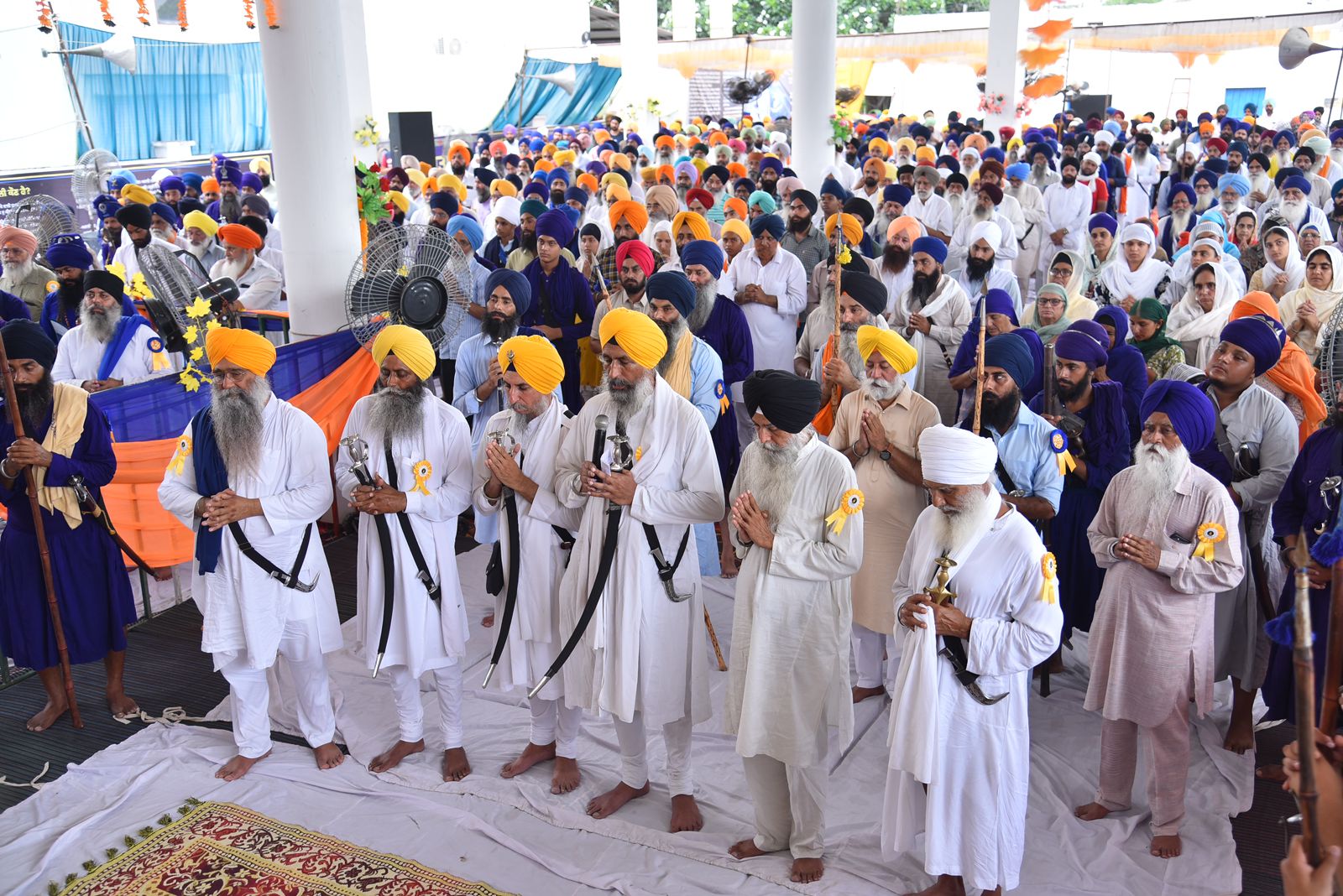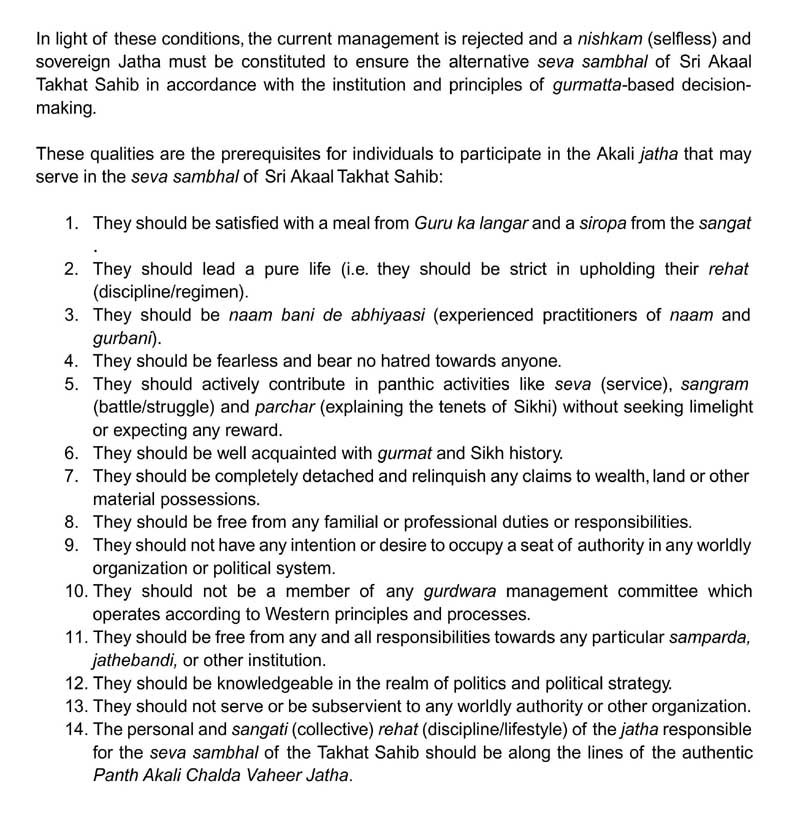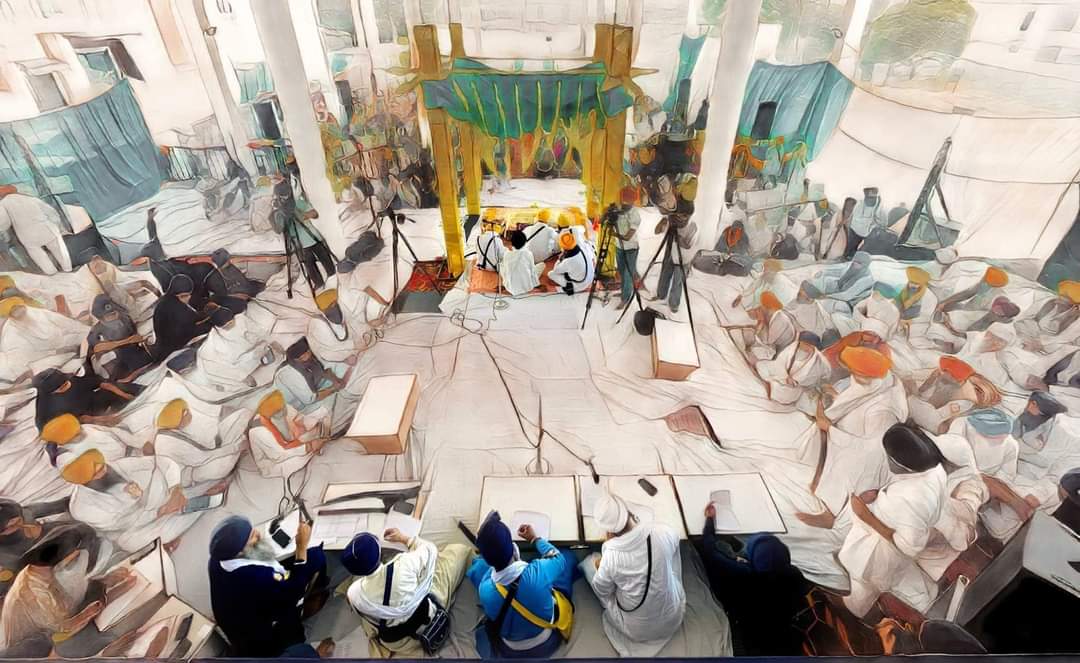Anandpur Sahib Meet rekindles century-old Sikhs’ Collective Decision and Leadership Tradition
In an awe-inspiring revival of Sikh heritage, a momentous gathering at Sri Anandpur Sahib shattered the chains of time to resurrect the age-old tradition of Gurmatta (collective decision-making) which was languishing in obscurity for over a hundred years. This historic event heralded a new era of selfless and sovereign leadership guided by the sacred Sikh principles of collective decision-making. A resounding testament to Sikh resilience, the echoes of this extraordinary meet will resonate in the times to come, asserts WSN editor Jagmohan Singh.
![In an awe-inspiring revival of Sikh heritage, a momentous gathering at Sri Anandpur Sahib shattered the chains of time to resurrect the age-old tradition of Gurmatta (collective decision-making) which was languishing in obscurity for over a hundred years. This historic event heralded a new era of selfless and sovereign leadership guided by the sacred Sikh principles of collective decision-making. A resounding testament to Sikh resilience, the echoes of this extraordinary meet will resonate in the times to come, asserts WSN […]](https://www.theworldsikhnews.com/wp-content/uploads/2023/06/World-Sikh-Collection-360x267.jpg)
IN A MOMENTOUS DEVELOPMENT that has impacted a vast section of the Sikh nation, aware of its rights, duties and obligations, a historic gathering took place at Sri Anandpur Sahib, resurrecting the traditional practice of Gurmatta (collective decision-making) after more than a century.
This groundbreaking event, held in the backdrop of Takht Kesgarh Sahib -the Sikh throne which embodies the unique status and form of the Khalsa Panth, witnessed the adoption of a Gurmatta that not only rejected the current management of Sri Akaal Takhat Sahib but also called for the establishment of a selfless and sovereign Jatha to ensure the alternative administration of Sri Akaal Takhat Sahib, guided by the principles of Gurmatta-based decision-making.
Years of dedicated grassroots work and extensive organizing efforts paved the way for this significant milestone in contemporary Sikh history. Panthic Jathas (groups) from across the world wholeheartedly participated, making it one of the most noteworthy Sikh gatherings in recent times and if followed through in the same spirit and zeal, in a consistent manner, it holds in its domain the possibility of a lasting impact on the future of the Panth.

At the commencement of the gathering, a collective Ardaas (prayer) was performed by the Panth Sewaks who had called for this historic meeting. They facilitated the proceedings as collective Sakhis (witnesses) to the decision-making process led by five Singh representatives. Open discussions were conducted regarding the suitability of each nominated individual to be part of the Panj (collective body).
The central focus of the deliberations revolved around rejuvenating the administration of Sri Akaal Takhat Sahib, liberating it from the influence and control of the Indian state, and restoring its status as the central hub of collective leadership for Guru Khalsa Panth worldwide.

Representatives from various organizations, Jathebandis (bodies), and Sampardas (religious orders) were invited to present their views to the Sangat (congregation), on the condition that they participated solely for the collective benefit of the Panth, setting aside personal interests.
After thoroughly hearing the perspectives of the Sangat, the Panj Singh representatives reflected on the suggestions in accordance with Sikh tradition and subsequently announced the collective decision to the Sangat.

 Notable organizations and jathas that participated in person include Shiromani Panth Akali Budha Dal, Damdami Taksal Ajnala, Misl Shaheed’aan Harianbela, Panth Sewak Jatha, SGPC member Bibi Kiranjot Kaur, Akhand Kirtani Jatha, Nihang Dal Panth Arb’aan Kharb’aan, Sahibzada Ajit Singh Dal Panth Chamkaur Sahib, Kendri Sri Guru Singh Sabha, Dal Khalsa, Jatha Sirlath Khalsa, Sri Guru Granth Sahib Satikar Committee, Satkaar Sabha Haryana, Nirmal Samparda, Guru Ki Mateeli Bagha Purana, Dal Baba Bidhi Chand ji Sursingh, Amrit Sanchaar Jatha Damdami Taksal, Damdami Taksal Jatha Langiana, Loh Langar Kartarpur Sahib, Kaar Seva Khadur Sahib, Kaar Seva Dukhniwaran Sahib, Akal Federation, Sikh Youth of Panjab, Ek Noor Khalsa Fauj, All India Sikh Students Federation, Darbar-E-Khalsa, Amrit Sanchar Jatha, Guru Aasra Trust Mohali, Panthic Akali Lehar, Gurmat Vidyala Damdami Taksal Janer, Miri Piri Seva Dal, Misl Shaheed’aan Tarna Dal Kotha Guru, Sikh Jatha Malwa, Panth Sevak Jatha Doaba, Chhauni Shaheed Bhai Maharaj Singh Naurangabadi, Damdami Taksal Jatha Kanakwal, Waris Panjab De, Gosht Sabha Punjabi University Patiala, Sikh Youth Federation Bhindranwala, Gatka Akhara Tibba Sahib Hoshiarpur, Sikh Youth Power of Panjab, Sath, Safi, and Budha Dal Jatha Hoshiarpur.
Notable organizations and jathas that participated in person include Shiromani Panth Akali Budha Dal, Damdami Taksal Ajnala, Misl Shaheed’aan Harianbela, Panth Sewak Jatha, SGPC member Bibi Kiranjot Kaur, Akhand Kirtani Jatha, Nihang Dal Panth Arb’aan Kharb’aan, Sahibzada Ajit Singh Dal Panth Chamkaur Sahib, Kendri Sri Guru Singh Sabha, Dal Khalsa, Jatha Sirlath Khalsa, Sri Guru Granth Sahib Satikar Committee, Satkaar Sabha Haryana, Nirmal Samparda, Guru Ki Mateeli Bagha Purana, Dal Baba Bidhi Chand ji Sursingh, Amrit Sanchaar Jatha Damdami Taksal, Damdami Taksal Jatha Langiana, Loh Langar Kartarpur Sahib, Kaar Seva Khadur Sahib, Kaar Seva Dukhniwaran Sahib, Akal Federation, Sikh Youth of Panjab, Ek Noor Khalsa Fauj, All India Sikh Students Federation, Darbar-E-Khalsa, Amrit Sanchar Jatha, Guru Aasra Trust Mohali, Panthic Akali Lehar, Gurmat Vidyala Damdami Taksal Janer, Miri Piri Seva Dal, Misl Shaheed’aan Tarna Dal Kotha Guru, Sikh Jatha Malwa, Panth Sevak Jatha Doaba, Chhauni Shaheed Bhai Maharaj Singh Naurangabadi, Damdami Taksal Jatha Kanakwal, Waris Panjab De, Gosht Sabha Punjabi University Patiala, Sikh Youth Federation Bhindranwala, Gatka Akhara Tibba Sahib Hoshiarpur, Sikh Youth Power of Panjab, Sath, Safi, and Budha Dal Jatha Hoshiarpur.

Representatives from Sikh jathas worldwide also participated, including Sikh Federation Germany, Babbar Khalsa Germany, Sikh Council Belgium, Sikh Federation Belgium, World Sikh Parliament (Germany), Gurdwara Sikh Center Frankfurt (Germany), Gurdwara Shri Guru Dashmesh Singh Sabha Cologne (Germany), Gurdwara Shri Guru Nanak Niwas Stuttgart (Germany), Gurdwara Guru Nanak Mission Neunburg (Germany), Gurdwara Guru Nanak Darbar Munich (Germany), Gurdwara Singh Sabha Leipzig (Germany), Gurdwara Singh Sabha Regensburg (Germany), Sikh Federation America (USA), Sikh Youth of America (USA), Gurdwara Sikh Sabha Glen Rock NJ (USA), Gurdwara Sahib Sikh Culture Society New York (USA), Philadelphia Sikh Society (USA), Gurdwara Sahib Fremont (USA), Free Akal Takht Movement, Sikh Research Institute, Sikh Federation UK, Sikh Sangat of Victoria (Australia), Sidney Sikh Sangat (Australia), Sikh Sevak Jatha Perth (Australia), Paris Sikh Sangat (France), Sikh Education Council UK, Panch Pardhani UK, National Sikh Youth Federation (UK), Adelaide Sikh Sangat (Australia), Windsor Sikh Panthic Jatha (Canada), Brisbane Sikh Sangat, Babbar Khalsa France, and World Sikh Parliament (France).
Palpably, these genuine and successful efforts to rejuvenate Sikh traditions of leadership and decision-making from the grassroots level, with the participation of diverse Panthic jathebandis from around the world, including prominent institutions and local jathas, hold immense significance and lay the groundwork for the eventual revival of the Sarbat Khalsa (Supreme Sikh assembly) in its truest and most meaningful form.
